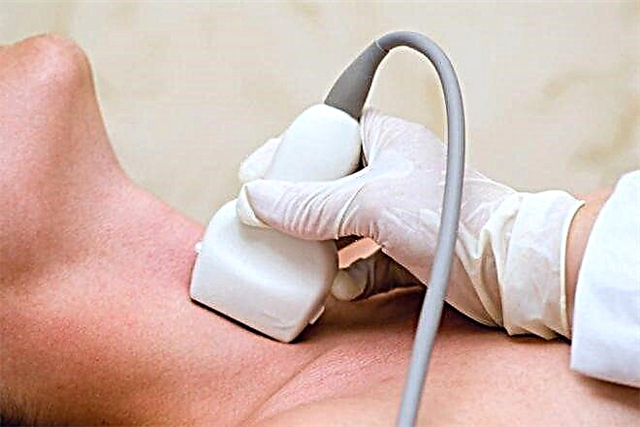The main cause of endemic goiter is the low iodine content of water, soil and food grown under these conditions. Unfortunately, diseases in this organ often develop at a rapid pace, which forces doctors to resort to the most radical methods. It is very difficult to detect this dangerous disease in the human body at the earliest stages. Thyroid cancer treatment in Germany is quite in demand today. The reason for this is the innovative technologies used in the medical field of this country, the professionalism of doctors and excellent conditions for a quick recovery.

Causes and symptoms of thyroid cancer
Thyroid cancer is not uncommon. And every year the tendency to face such a disease is increasing. The disease is more common in women than in men and affects people of all ages.
The thyroid gland is an organ of internal secretion that is involved in many processes in the body. It is very difficult to recognize thyroid cancer, as it often proceeds under the guise of other diseases.
The task is also complicated by the fact that the symptoms that appear in the patient have nothing to do with the gland itself. When they are found, patients often turn to specialists of related profiles, not even suspecting that the problem lies in something completely different.
The reasons for the appearance of a tumor in this organ are not fully understood. This circumstance is an incentive for German doctors to delve into the etiology of the disease, which makes it possible to quickly diagnose a tumor and develop effective methods of influencing it.
The main risk factors for the development of cancer cells are:
- work with substances that are contaminated with radioactive iodine;
- disorders in the genetics of the body;
- heredity;
- susceptibility to chronic diseases of the organs of internal secretion;
- oncology of the uterus, mammary glands, ovaries;
- age signs: puberty and people over 50;
- violation of immunity;
- iodine deficiency;
- alcohol abuse and smoking;
- mutation of the p53 gene, which can cause anaplastic carcinoma.
It is important to remember that in the early stages, a cancerous tumor of the gland does not give itself out at all. Sometimes it is discovered by accident during examination for other complaints.
In the later stages of cancer development, its presence can be determined by the following symptoms:
- lump in the neck that is visualized and palpable. Most often it is static and increases over time. The nodules can be elastic to the touch, and if the disease has already reached its late stages, they can be dense;
- a constant sensation of the presence of a lump in the throat. At first, the patient notices him only while eating, and later - constantly. In most cases, it does not cause any worries other than discomfort;
- difficulty swallowing. This indicates that the gland has increased significantly in size;
- change in the size of the lymph nodes in the neck;
- pain in the cervical spine that can resonate in the ear;
- change of voice;
- cough (if the likelihood of a viral disease is excluded).
These signs can be supplemented by a sharp decrease in the calcium content in the body, the appearance of hot flashes and constant pressure in the neck.
Thyroid cancer can be divided into several groups:
- Papillary carcinoma. Occurs in 80% of cases. It is characterized by a very slow course of development, but at the same time it can affect the lymph nodes. Only one lobe of the organ is affected. The prognosis of treatment is most often favorable, and death is extremely rare.
- Follicular carcinoma. The second most common form of cancer. It occurs in 10% of cases. It is typical for countries where food contains little iodine. It rarely penetrates the lymph nodes, but it affects other organs. For example, lungs and bones. In most cases, this form is curable, although death is more common.
- Medullary carcinoma. It accounts for 6% of cases. It is formed from cells that produce calcitonin, a hormone that controls the presence of calcium (Ca) in the bloodstream. Tumor formation is usually reported by high levels of Ca and carcinoembryotic antigen. It affects the nodes of the lymphatic system, lungs, liver. The prognosis for treatment is not very favorable due to the inability to diagnose in the early stages.
- Anaplastic carcinoma. It is extremely rare - 2-4% of cases. Determining the type of tumor cells is rather difficult. It develops most often from papillary and medullary carcinoma. It grows very quickly, metastases spread even to organs located far from the thyroid gland. All this creates great difficulties in treatment.
Disease stages:
- Up to 45 years old. Fatalities are extremely rare. Cancer in this age group has two stages:
- The tumor can grow to any size without metastasizing to other organs. The maximum harm is damage to nearby lymph nodes.
- Reaches any size, spreading metastases to distant organs.
- After 45 years:
- Stage 1 - grows up to 2 cm, is not characterized by metastases;
- Stage 2 - reaches a diameter of up to 4 cm.The tumor does not go beyond the organ itself.
- Stage 3 - the diameter exceeds 4 cm, it can affect the cervical lymph nodes.
- Stage 4A - lesions extend beyond the gland, but not further than the cervical and thoracic lymph nodes.
- Stage 4B - the tumor grows into the neck or nearby vessels. Distant metastases are absent.
- Stage 4C - metastasizes to other organs, characterized by the development of lymphoma. The tumor itself can grow to any size, but not even go beyond the border of the gland.
All forms of anaplastic carcinoma are generally considered to be grade 4 cancer. It is usually divided into three stages:
- A - foci of metastases are found only in the nearest lymph nodes. The tumor does not go outside the organ.
- B - the tumor grows beyond the outer borders of the thyroid gland;
- C - affects other organs.
Diagnostic methods
Before embarking on diagnostic procedures, the patient is examined by an endocrinologist, oncologist, ENT, and, if necessary, by a gynecologist.

In German clinics, patients with suspected thyroid cancer undergo comprehensive diagnostics:
- Ultrasound of the gland;
- X-ray examination of internal organs;
- molecular genetic research;
- blood test;
- biopsy. Using a thin needle, a piece of material is taken from the gland for analysis. The procedure is performed under the visual control of ultrasound;
- radioisotope scanning of an organ (scintigraphy). Allows you to establish the degree of development of a cancerous tumor and the presence of metastases;
- laryngoscopy or bronchoscopy - the study of the lungs and the respiratory system as a whole for metastatic lesions;
- CT of the neck - allows you to study the state of deep tissues;
- MRI.
Based on the individual characteristics of the disease, other methods of examination for oncology may be prescribed: pneumography (determining the degree of tissue damage around the thyroid gland), angiography (for violations in the vascular system), radiopaque enhancement using barium, and others.
Treatment
Conducting a comprehensive examination makes it possible to get a complete picture of the disease and prescribe an appropriate method for solving the problem. The fundamental principle in this case is the stage of the cancerous lesion.
- Initial.The main task of doctors at this stage is to keep the organ in a viable state, removing only the lesion and the tumor itself. To do this, apply:
- Minimally invasive surgery - resection of part of one of the lobes of the thyroid gland. Usually the Gamma Knife is used for these purposes.
- Radiation therapy - targeted irradiation of the tumor site to eliminate residual effects;
- Second and next stages. If the tumor has reached a large size and has spread to other organs, this indicates that the complete removal of the thyroid gland or most of it is ahead. Usually a combination of different methods is used for this:
- Surgery to remove the affected tissue, partial excision of the cellular tissue of the neck, Fascial-sheath dissection. All this is carried out in minimally invasive ways with the preservation of the functions of the facial nerve endings and minimal damage to the skin. Thyroidectomy (complete removal of the thyroid gland) is performed only in the most extreme cases.
- Chemotherapy and radiation exposure - irradiation of the desired area and the introduction of appropriate drugs into the blood, which destroy the growth of cancer cells.
- Hormone therapy - the patient is prescribed levothyroxine sodium, which minimizes the risk of re-developing the disease after the organ has been removed.
Where to contact
Germany has 30 large medical centers with a professional research and scientific base, 15 oncology clinics and hundreds of small medical institutions with cancer departments.
The largest in the country are:
- Clinic in Hamburg.
- Cologne Cancer Center.
- Clinic in Stuttgart.
- Oncology center in Frankfurt.
- Consolidation of city clinics in Munich, which includes such divisions as "Harlaching", "Schwabing", "Neuperlach", "Bogenhausen".
- Surgical Department of the Red Cross Clinic, Frankfurt am Main.
- University Clinical Complex “To the Right of Isar”, Munich.
All the listed medical institutions are equipped with the latest equipment, and poor-quality treatment as a phenomenon does not occur here at all.
How much will the treatment cost?
Each clinic offers its own set of methods of examination and therapy. Therefore, it is impossible to say how much money will be required to complete the course. Here are just the national averages (in euros):
| Service | Estimated cost, € |
|---|---|
| Consultation with relevant specialists | 500-550 |
| Diagnostics (blood test, radionuclide scanning, biopsy, scintigraphy, follow-up consultation on how to eliminate the problem) | 500-2000 |
| Partial resection of the thyroid gland together with the neoplasm | 8000 |
| Complete removal of the gland | 8500 |
| Iodine therapy | 4500 |
| 1 course of chemotherapy (excluding drug prices) | 1000-4000 |
| Radiation therapy | 3000 |
The final amount will include the cost of hospitalization, treatment and medical care.
Organization of the trip
Getting ready to travel, you need to be prepared for the fact that it will require a certain investment of time and effort from you. The step-by-step process looks like this:
- Find a clinic or doctor who is treating the disease you are looking for.
- Contact the medical institution by e-mail with the medical history, medical history and the results of all examinations performed.
- If the answer is yes, the administration will send the amount of treatment and the account number to which the funds will need to be transferred.
- After that, an invitation will be sent to you, on the basis of which the German consulate will open a visa of the required sample. Most often, this is a category C visa stamp, which allows you to stay in the country for three months.
To avoid hassle, you can entrust the organizational measures to an intermediary company. Such operators take care of all issues, from finding a clinic to collecting the necessary papers.
Rehabilitation period
After the dangerous tumor is eliminated, the body will need serious rehabilitation. The recovery stage can take a long time, and therefore it is necessary to approach this issue with all responsibility. After a rather serious surgical intervention, the patient is faced with such a problem as decreased immunity, mental fatigue.
The attending physician should prescribe a program of necessary measures. For this reason, if the main stage took place in Germany, then it is better to organize rehabilitation in a German clinic, especially if you happen to get into a multidisciplinary institution.
Typically, the recovery process includes:
- physiotherapy;
- drug treatment;
- psychologist's consultations;
- moderate physical activity;
- an individually designed diet.
An excellent solution would be one of the many German resorts.
Conclusions
Cancer of the thyroid gland is not one of the common diseases and causes concern among doctors, since its symptoms are very similar to diseases of other organs. Sometimes it is possible to detect a tumor only at later stages, which lead to partial or complete removal of the gland.
In German clinics, the patient is offered to undergo a comprehensive examination, which makes it possible to establish the form of the disease, its stage and the degree of penetration into other organs. At the initial stages, cancer can be managed with medication or minimally invasive operations. After eliminating the problem, it is necessary to go through a long rehabilitation period, preferably without leaving the country - at one of the German resorts.











